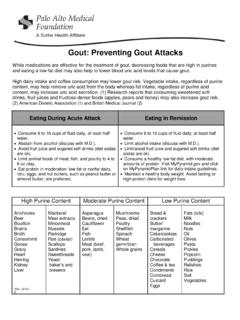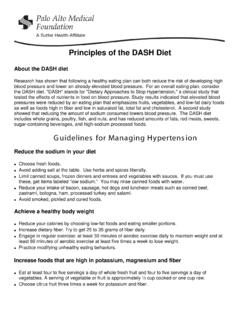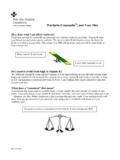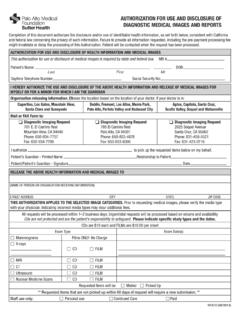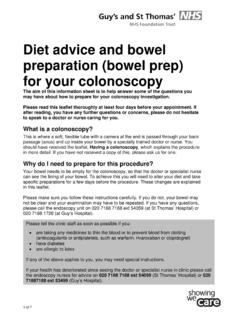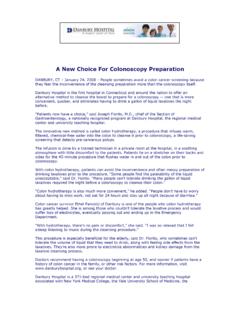Transcription of Colonoscopy Preparation Instructions with …
1 Colonoscopy Preparation Instructions with magnesium citrate IMPORTANT: For the best results and to prevent the need to cancel or reschedule your Colonoscopy : 1. Only follow department Instructions given by your gastroenterologist or on this instruction sheet. 2. magnesium citrate is available over-the-counter (without prescription) 3. You will need to purchase three (3) 10-ounce bottles of magnesium citrate (lemon/lime flavor) from your pharmacy. Seven (7) days before your procedure STOP: OKAY/APPROVED: 1. Aspirin unless prescribed by a physician 1. Any regular medications (especially blood pressure 2. NSAIDs including: Ibuprofen (Motrin, Advil), Naproxen and/or cardiac medications (Aleve, Naprosyn), and similar medications 2. Acetaminophen (Tylenol) 3. Iron, fish oil and vitamin E 3. Foods such as: meats (chicken, pork, beef), fish, tofu, 4. All seeds, nuts, popcorn white bread, white rice, noodles, yogurt, fruits and vegetables (remove skin and seeds), pasta, eggs, pancakes, cheese and dairy products You will receive additional Instructions , guided by your prescribing physician, if you are taking: Blood thinner medications such as Warfarin (Coumadin), Heparin, Lovenox, Plavix, Aggrenox, Ticlid, Pradaxa Diabetes medications The day before your procedure STOP (in addition to above): OKAY/APPROVED: 1.)
2 Any solid food 1. Any regular medications (especially blood 2. Dairy products pressure and/or cardiac medications) and 3. Alcohol acetaminophen (Tylenol) 2. Water and clear liquids including: Juices: apple, white grape, white cranberry, lemonade Broth: chicken, beef or vegetable Soda: 7- U p, C o ke Other: black coffee, tea, popsicles, jello, sports drinks Eating any solids may result in your procedure being cancelled. Make sure to drink clear liquids throughout the day to keep yourself well-hydrated. 6 the day before your procedure: 1. Drink one-and-a-half bottles of magnesium citrate . 2. Drink an additional three glasses (8 oz each) of clear liquids, and continue to drink clear liquids (at least two more glasses) before bedtime..Continues on back side The day of your procedure The day of your procedure Continue your clear liquid diet. Take your regularly prescribed morning medications (with a small sip of water) unless instructed otherwise.
3 5 hours before your scheduled procedure time: Drink the rest of the prep solution 1. Drink the remaining one-and-a-half bottles of magnesium citrate . 2. Drink an additional three glasses (8 oz each) of clear liquids. 3 hours before your scheduled procedure time: No eating or drinking until after your procedure. Additional Important Information Regarding Your Colonoscopy Before your procedure While drinking the Preparation medication: 1. Consider using petroleum jelly or diaper rash ointment around the anus before starting the prep and after each bowel movement to minimize irritation from passing many bowel movements. 2. To prevent dehydration, drink plenty of fluids before (as instructed above) and after the procedure. Your body can lose significant amounts of fluids during the bowel Preparation . 3. Feelings of bloating, nausea, abdominal cramping or chills are common. This should decrease over the course of the bowel Preparation .
4 4. If you develop severe nausea or vomiting, stop drinking the bowel prep for 30 minutes, and then start again once you are feeling better. Transportation Reminders 1. You must arrive at your given location one (1) hour before your scheduled procedure time. Your entire stay will be between 2 to 3 hours. 2. You are not permitted to take a taxi, operate any mode of transportation yourself or use any public transportation to get home after the procedure. A responsible adult will need to drive you home, and someone should stay with you for at least 2 hours to make sure there are no issues following the sedation or procedure. What to expect upon arrival for your procedure 1. Prior to the procedure, a nurse will ask you questions to ensure that you understand the procedure and the reason for it, and to ensure that you prepared properly for it. The gastroenterology doctor will also review the procedure with you.
5 2. The nurse will start an intravenous line to administer medications. The intravenous line is similar to having blood drawn. Your vital signs (blood pressure, heart rate, oxygen saturation) will be monitored closely before, during and after the procedure. 3. The Colonoscopy will be performed while you are lying on your left side. Medications to help you relax (sedative) and narcotic (to help with discomfort) will be administered intravenously. Some people sleep during the examination, while others are very relaxed, comfortable and awake. This is NOT general anesthesia. After the procedure 1. Rest for the remainder of the day for your health and safety! 2. Do not participate in any activities which require coordination or judgment. You may return to regular activities the day after the procedure. 3. If a polyp is removed we recommend no travel for two weeks from your date of procedure. Check with your doctor if you are planning to travel internationally.
6 4. Some bloating, gas or mild cramping is normal and should diminish. 5. At the conclusion of your procedure, you will receive specific information about findings, post-procedure Instructions and precautions. Frequently Asked Questions about Colonoscopy What is a Colonoscopy ? A Colonoscopy is a routine and commonly performed procedure, in which a highly trained doctor (called a gastroenterologist) will insert a colonoscope (a flexible tube containing a camera at the tip) into the rectum and colon (large intestine), to carefully inspect the colon. The scope is about the width of your finger, and the procedure is typically painless, as patients are sedated. A typical Colonoscopy takes about 20-30 minutes. Why is a Colonoscopy recommended? Your physician has recommended that you get a Colonoscopy . The most common reason to have a Colonoscopy is as a screening test for colon (and rectal) cancer. Colorectal cancer is the third leading cause of cancer deaths in the United States; the average risk for developing colorectal cancer is about six percent.
7 Colonoscopy is a safe, proven and effective means to detect colon cancer. Colonoscopy can also be useful for the evaluation of conditions, such as bleeding, chronic diarrhea and anemia (low blood counts). What is a polyp? Polyps are abnormal growths of tissue that form on the lining of the colon. Polyps are almost always benign. While many benign polyps are harmless, others are considered precancerous. Precancerous polyps carry the potential to turn into cancer. They are generally slow growing, so a small precancerous polyp may take 10-15 years to turn into cancer. Approximately 30 percent of people over the age of 50 have precancerous polyps. Colonoscopy permits the early detection and removal of polyps. Because almost all colorectal cancers start as small polyps, the removal of these polyps at the time of Colonoscopy is an effective means to prevent colorectal cancer. The removal of polyps (polypectomy) is a painless procedure.
8 What can I expect during a Colonoscopy ? A Colonoscopy is generally a well-tolerated procedure. Most patients are given a sedative and pain medication through an IV that is placed by the nurse before the procedure. Because of these medications, most patients do not experience pain or remember the procedure. You will typically lie on your left side during the procedure, although in some cases, you may be repositioned. Most colonoscopies last 20-30 minutes, and are followed by another 30 minutes in the recovery area. During a Colonoscopy , your doctor is carefully inspecting the colon and may remove polyps (polypectomy) or take biopsies (which involves the painless removal of a small sample of the tissue lining). What are the risks of complications of Colonoscopy ? Colonoscopy is a safe and routine procedure, but like any procedure, it does carry some risks which are small and uncommon. Statistics show that our rate of major complications (1 in 2,000) is significantly lower than the national average.
9 The most serious complication is a perforation, or a tear of the wall of the colon. In some cases, this might require emergency surgery. Bleeding is another possible complication, which can occur at the site where a polyp is removed (or biopsied). Bleeding typically stops on its own, but may require further treatments (including blood transfusions). Will I be sleeping during the procedure? Patients receive a sedative (medication related to Valium) and a pain killer (medication related to morphine) during the procedure. This type of sedation is called moderate sedation, sometimes described as twilight sleep. Most patients are very comfortable and experience no pain, and have no memory of the procedure. Technically, patients are conscious during these procedures, are able to respond to questions, and can maintain their blood pressure and breathing at safe levels on their own. Some patients may wake up towards the end of the procedure.
10 They may even watch the procedure on a monitor (most patients find this very interesting) and remain completely comfortable. If needed, sedatives can be increased. This type of sedation is different from general anesthesia, which is a deeper level of sedation in which patients are unconscious. In these cases, an anesthesiologist is needed to help the patient to regulate their blood pressure and breathing. Any form of sedation does carry risks (of breathing and heart problems), but these risks are very low with moderate sedation. 11/15/15 15-PAMF-0004476 Frequently Asked Questions about Colonoscopy What can I expect after a Colonoscopy ? You will be monitored closely in the recovery area as the sedatives wear off. You may experience some cramping and bloating and you will be encouraged to pass flatus which will help you to feel better. Because sedatives may impair your judgment and coordination, you will be required to have someone drive you home and to stay with you for a short time after the procedure.

